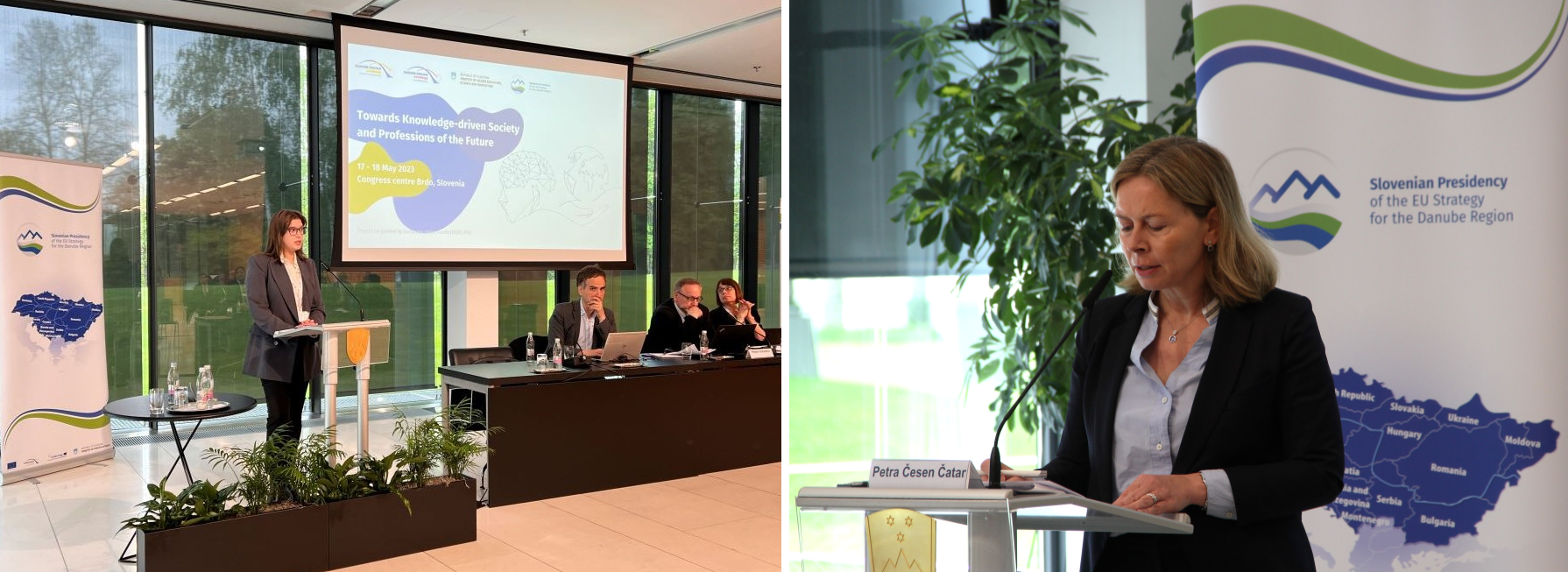The first thematic conference organised by the EUSDR Slovenian Presidency took place on 17 and 18 of May, in Brdo pri Kranju, focusing on the importance of developing future societies based on knowledge and adapted to the changed brought on by the green and digital transformation.
Mr Marko Štucin, State Secretary at the Ministry of Foreign and European Affairs of the Republic of Slovenia and Mr Jure Gašparič, State Secretary at the Ministry of Higher Education, Science and Innovation of the Republic of Slovenia expressed the Slovenian viewpoints on the topic, pointing out the necessity of involving young people in building a balanced and sustainable future and the need for regional stakeholders to foster research cooperation and provide the best possible knowledge for sustainable solutions. Such solutions can be found only on the basis of developed strong synergies between higher education, research, innovation, employment policies and their instruments.
Danube Youth Council member Ms Anja Filipović joined the discussions in the first day of the conference, speaking on the competencies needed by the youth workforce for the year 2040. She pointed out that macro-regional strategies can provide a framework for collaboration and coordination among the countries within the region and can facilitate the development of educational programmes tailored to the competencies needed by the youth. Macro-regional strategies can also promote the exchange of best practices, encourage cross-border mobility, and foster partnerships between educational institutions, business sector and NGOs. By leveraging the region’s collective strength, they can create a supportive environment for youth development.
The topics on the agenda also included the Strategic Foresight Perspective and R&I Foresight Perspective on the knowledge-driven society of 2040 (uncovering the competencies perspective of the workforce in 2040 and international practices in the field of forecasting needs of the labour market), forecasting the needs of the market in 2040 and the need for better coordination and integration on the policy level and overcoming policy challenges through collaboration.
It was also mentioned that professions of the future cannot be predicted entirely today, but we need to start adapting and be flexible and focused on skills so that people of the future will be able to adapt to them. Collaboration and openness between research institutions, innovation institutions and higher educational institutions are much needed.
Ms Petra Česen Čatar, EUSDR Slovenian Presidency, closed the conference, stating that the challenges related to the knowledge society and professions of the future cross the national borders. Therefore, the improvement of cross-sectoral thinking is necessary, cooperation in science and innovation should go hand in hand, while involving young generations into this topic is a must. Nowadays generations need appropriate knowledge to create future professions, and for this the topics of talent retention and brain drain mentioned during the conference will be resumed during the POPRI challenge and Young Bled Strategic Forum, including also young people.
The conclusions of the conference will be an important contribution to the ministerial meeting that will take place within the framework of the 12th EUSDR Annual Forum in October and will be part of the Joint Statement of Ministers for the future implementation of the EUSDR.





